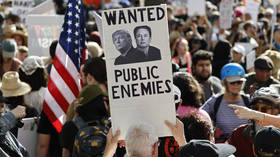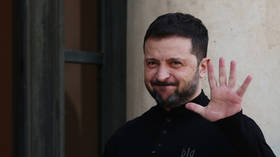Harassment at US intel agency threatens spying efforts – WSJ

Retired Air Force pilot Lt.Col. Ryan Sweazey has gone public with 30 witness statements from Defense Intelligence Agency personnel alleging the agency was not only a “toxic” workplace but a security risk after his attempts to seek justice within the agency were allegedly rebuffed.
The DIA’s toxic culture is not only a “threat to national security,” Sweazey told the Wall Street Journal on Saturday, but its actions are “alienating and disenfranchising our intelligence personnel while disrupting and degrading operations.”
Sweazey collected the witness statements from members of DIA subsidiary the Defense Attaché Service on his own last year, submitting them to Congress himself after the DIA appeared to slow-walk its response to his official complaints. While the agency has issued a statement insisting it had “zero tolerance” for violations of professional standards, it reportedly has yet to act on any of the retired lieutenant colonel’s or his interviewees’ complaints, which largely focus on the service’s European offices.
Several witnesses interviewed by Sweazey reported on how management had been turned against subordinates, with individual employees allegedly scoring points by exposing information on each other. Sweazey himself claimed to have been blackballed with a poor performance review and barred from a plum assignment after attempting to get the DIA’s attention by writing to its head that workplace toxicity was “a cancer that directly threatens the mission and national security.”
One witness even testified he had had his own private medical records used against him.
“Members of the attaché service cannot perform their duties for fear of being arbitrarily recalled, ridiculed for effort or threatened with poor performance evaluation,” the witness said in a letter to Congress last year. He also reported being pulled from his attaché position in Europe early and discouraged from writing “too many” intelligence reports. The inspector general nevertheless found no evidence he had been subject to any sort of reprisal.
A recent survey of members of the Defense Attaché Service found nearly half the 79 respondents said they had witnessed some form of hostile behavior at work, whether intimidation and bullying or harassment. Nearly a third reported having personally experienced racial, gender, or other discrimination. Even more troublingly, one witness’ supposedly anonymous survey response was reportedly used against him in an effort to close off career advancement.
While attaché service director Michael Bochna emailed staff following the survey’s dire revelations about the state of the service, promising leadership would take notice, no changes appear to have been forthcoming.
This is not the first time the DIA and its subsidiaries have been accused of sidelining investigations into perceived problems within the agency. A pair of whistleblowers from the agency’s Office of the Inspector General came forward in 2015 with similar complaints, including retaliation against whistleblowers, orders to publish fewer reports, and demands to soft-pedal or cover up problems within the agency.
Those whistleblowers claimed an inordinate number of agents working for the Office of the Inspector General left the service, either voluntarily or by being pushed out in retaliation for attempting to do their jobs correctly, since the office’s current director Kristi Waschull arrived in 2014.













